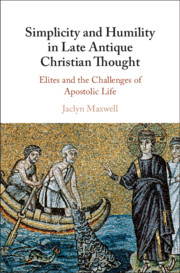 Simplicity and Humility in Late Antique Christian Thought
Simplicity and Humility in Late Antique Christian Thought Book contents
- Simplicity and Humility in Late Antique Christian Thought
- Simplicity and Humility in Late Antique Christian Thought
- Copyright page
- Dedication
- Contents
- Acknowledgments
- Abbreviations
- Introduction
- Chapter 1 Roman and Early Christian Attitudes toward Social and Economic Divisions
- Chapter 2 Christian Attitudes toward Social and Economic Divisions in Late Antiquity
- Chapter 3 Tentmakers and Fishermen
- Chapter 4 Apostolic Simplicity and Elite Education in Late Antique Theological Controversies
- Chapter 5 The Virtue of Humility in Late Antiquity
- Conclusions
- Bibliography
- Index
Introduction
Published online by Cambridge University Press: 26 March 2021
- Simplicity and Humility in Late Antique Christian Thought
- Simplicity and Humility in Late Antique Christian Thought
- Copyright page
- Dedication
- Contents
- Acknowledgments
- Abbreviations
- Introduction
- Chapter 1 Roman and Early Christian Attitudes toward Social and Economic Divisions
- Chapter 2 Christian Attitudes toward Social and Economic Divisions in Late Antiquity
- Chapter 3 Tentmakers and Fishermen
- Chapter 4 Apostolic Simplicity and Elite Education in Late Antique Theological Controversies
- Chapter 5 The Virtue of Humility in Late Antiquity
- Conclusions
- Bibliography
- Index
Summary
During the lengthy, complex, and uneven process of Christianization in Late Antiquity, various aspects of “common sense” were changing. Recent studies of attitudes about sexuality, wealth and poverty, and slavery have examined how worldviews adjusted while traditional Roman culture was absorbing Christian values, and vice versa. This book aims to contribute to these discussions by examining the friction between the traditional social values of the Roman elite and the potential social radicalism of Christian teachings. How did upper-class Christian authorities make sense of their own social, economic, and cultural privileges while embracing a religious tradition founded by carpenters and fishermen? What social values did well-born Christian writers exhibit or promote when they addressed each other and laypeople in their letters and treatises? What social values did they exhibit or promote when they addressed laypeople in their sermons?
- Type
- Chapter
- Information
- Simplicity and Humility in Late Antique Christian ThoughtElites and the Challenges of Apostolic Life, pp. 1 - 11Publisher: Cambridge University PressPrint publication year: 2021
